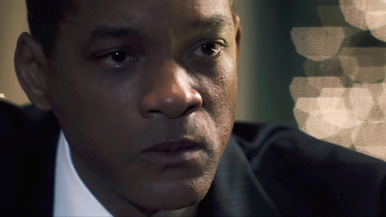Movie Review: Concussion
By Matthew Huntley
December 30, 2015
BoxOfficeProphets.com

This is yet another biographical sports film that’s “Based on a true story,” although I have a feeling the GQ article that inspired it, “Game Brain” by Jeanne Marie Laskas, reads better than the movie plays, not to mention offers more insight. Will Smith stars as Dr. Bennet Omalu, a Nigerian physician who, in the opening scene, lists out his long list of exceptional credentials to a jury in a murder trial. Omalu is a witness for the defense and he testifies that the accused is innocent due to his unique strain of hemophilia. Omalu’s explanation may sound long-winded and laborious, but his knowledge and enthusiasm make us believe he’s correct.
Indeed, Omalu is a very proud and accomplished man. His number one dream is to become an American and in 2002 he’s working as a forensic pathologist under the leadership of Dr. Cyril Wecht (Albert Brooks) in Pittsburgh, Pennsylvania. Omalu takes his work very seriously and is extremely methodical in the way he tries to determine why people died, not just how. He only uses clean tools; he listens to relaxing music while cutting people open; and he always tells to his deceased “patients” beforehand that he needs their help.
Wecht recognizes the young doctor’s commitment but isn’t afraid to let Omalu know that what he possesses in intelligence and work ethic he lacks in social skills and companionship. Omalu lives alone and his apartment essentially serves as his second office. It’s not until the priest at his church asks him to host Prema (Gugu Mbatha-Raw), a nurse from Kenya, that Omalu starts to come out of his shell and loosen up. Before we know it, after just one date at a dance club, he and Prema are in love and engaged to be married.
All this happens amidst a tragic event when Mike Webster (David Morse), the former center for the Pittsburg Steelers, dies suddenly at the age of 50, apparently from suicide. Webster’s death shakes the city, not only because he played a central role in the team earning four Super Bowl championships beginning in the late 1970s, but also because so many viewed him as a local hero who helped raise the town’s spirits and confidence. Omalu is asked to perform Webster’s autopsy, and despite his colleagues asking him not to “cut Webster up” out of respect, Omalu proceeds as normal, although the reason for Webster’s death isn’t immediately apparent. Omalu can’t figure out why a seemingly healthy, middle-aged man would suddenly go insane and kill himself.
Omalu decides to fund his own research and eventually declares a new brain disease to which he attributes Webster’s death called chronic traumatic encephalopathy, or CTE, which is caused by repeated blows to the head. He argues the human brain does not have its own natural suspension to keep it in place when it’s subject to sustained trauma, which can lead to the release of harmful proteins that trigger symptoms such as paranoia, cognitive dysfunction, and depression. Despite his findings being published in a reputable medical journal, the NFL dismisses Omalu’s claims.
And because the NFL is so powerful (“This is a corporation that owns a day of the week,” Wecht says) and wants to save face and avoid responsibility, Omalu starts to receive threats. One of his allies turns out to be a former NFL doctor, Julian Bailes (Alec Baldwin), who believes this disorder should be brought to light and one the NFL should finally recognize. Bailes informs Omalu it was actually brought to the organization’s attention years ago but they denied it after conducting their own “tests” through doctors that did not even specialize in brain function. Omalu’s investigation and quest to expose the truth proves to be a formidable struggle but he believes he’s discovered a pattern when other NFL players display the same symptoms as Webster (and suffer the same ill fate).
Clearly, Concussion has enough viable threads to make for a relevant and provocative story, but it ultimately falls short and the reason, I think, is writer-director Peter Landesman doesn’t trust the audience to grasp a more intelligent presentation of the facts. Therefore, he simplifies not only Omalu’s personal developments but also the conspiracy surrounding CTE and the NFL. This is evident when the movie relegates Prema to that of helpless victim, and true story or not, what eventually happens to her just doesn’t seem believable in the context of the film.
More frustrating is the way the film fails to explain what CTE is, how exactly Omalu discovered it, and the NFL’s role in trying to hide it. The screenplay discusses the subject in layman’s terms and the movie comes across as a storybook with more pictures than words. It’s as if Landesman assumed we wouldn’t want to learn something scientific during a mainstream Hollywood drama or didn’t have the mental capacity.
Another issue is that, outside of the main cast members, the rest of the characters come across as one-dimensional. This includes the other NFL players, to whom the film jumps around just to illustrate CTE’s symptoms. Then there are the NFL executives, who the film paints as automatic villains, including newly appointed NFL commissioner Roger Goodell (Luke Wilson) and Christopher Jones (Hill Harper), who we assume is a lawyer, although his role in the organization isn’t entirely clear.
Concussion just seems lazy and dumbed down. It not only stops short of character development, which is a shame since Smith is perfectly capable of making us care about Omalu and convinces us he really is a Nigerian doctor, but more importantly, it (mistakenly) assumes we don’t want to learn the specifics surrounding its larger topic, both in terms of its science and social and corporate ramifications. The result is a small mess of a drama with plenty of emotional and cerebral buttons, but in the end, that’s all they are: buttons. They unfortunately don’t do anything when the film pushes them.